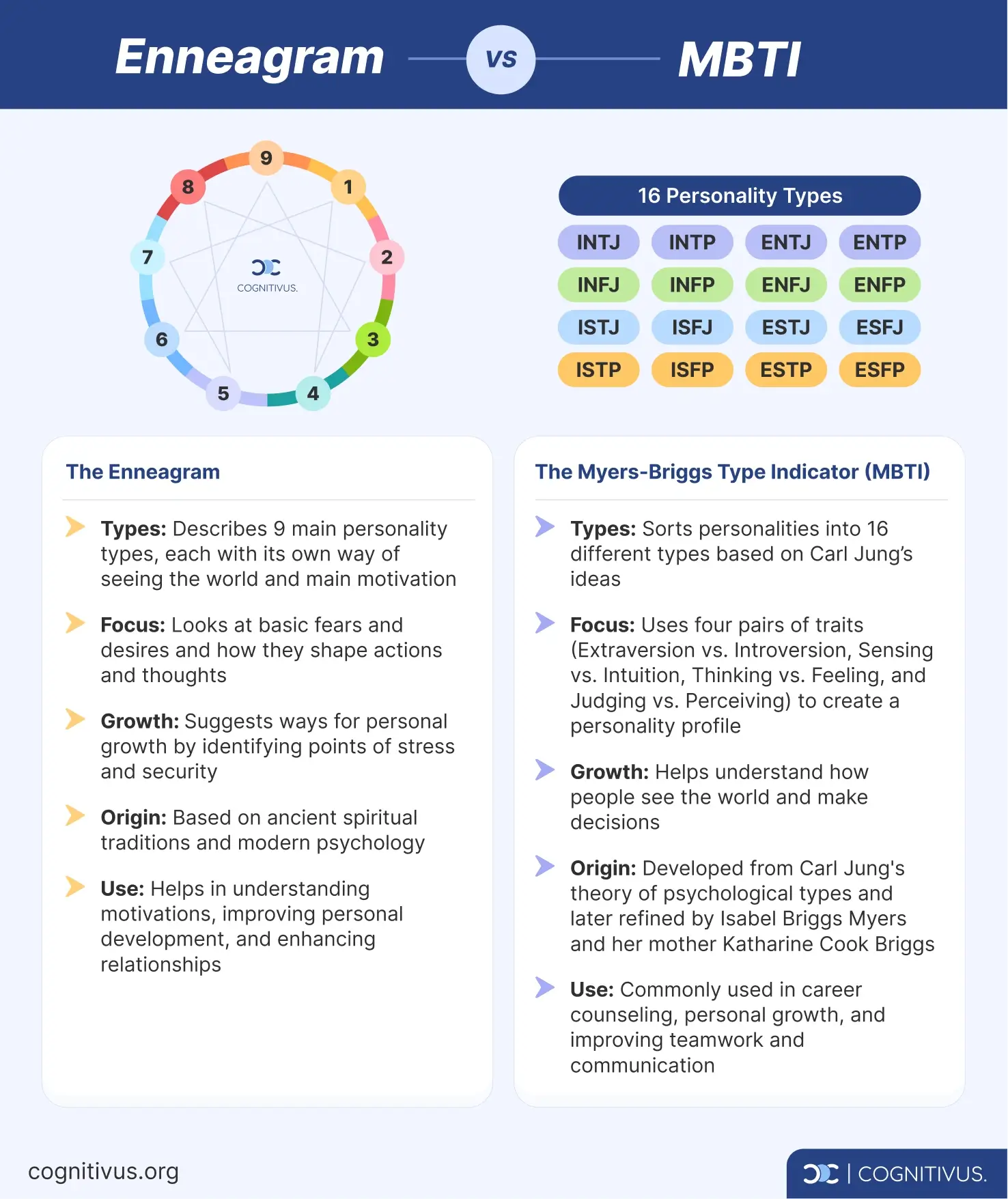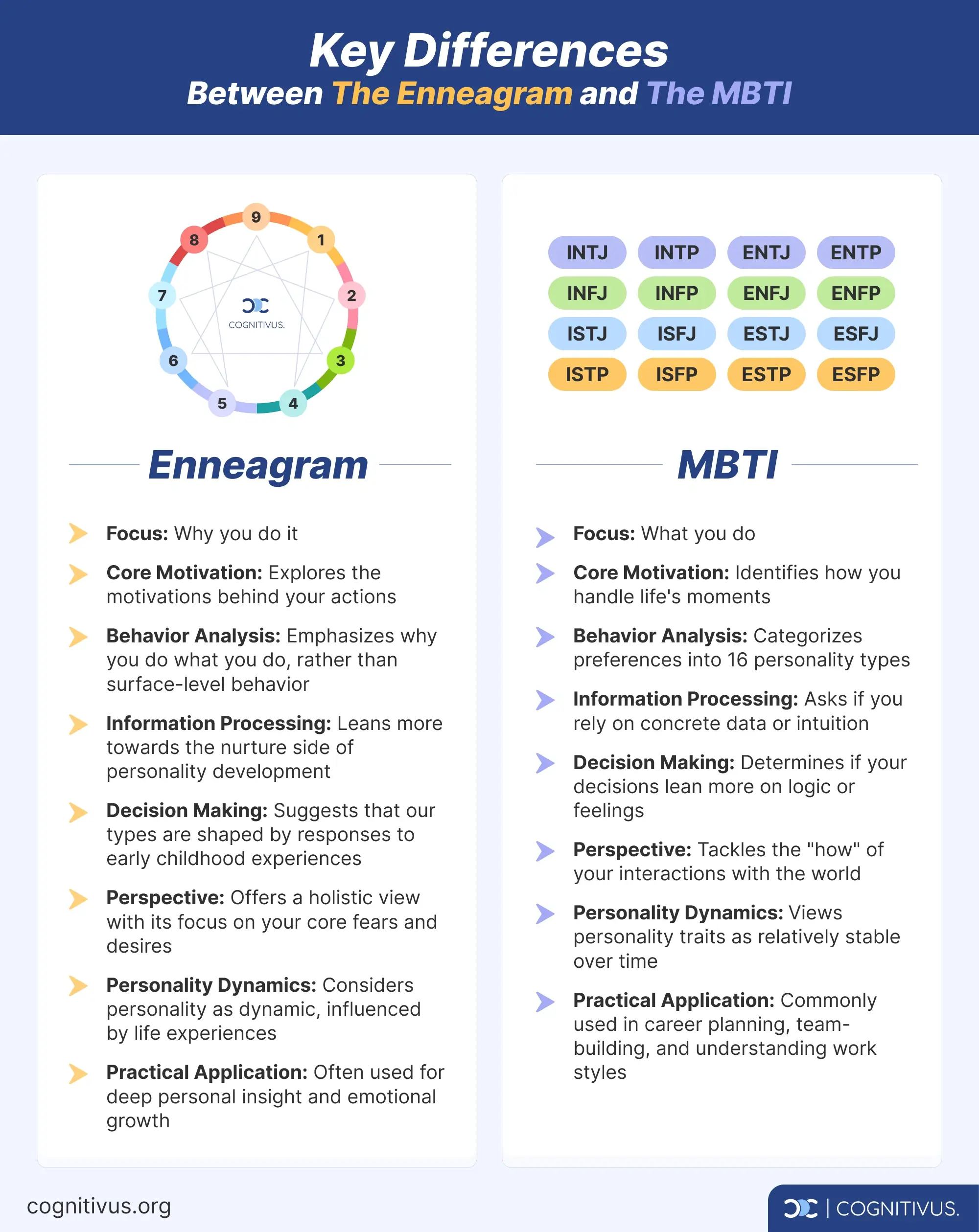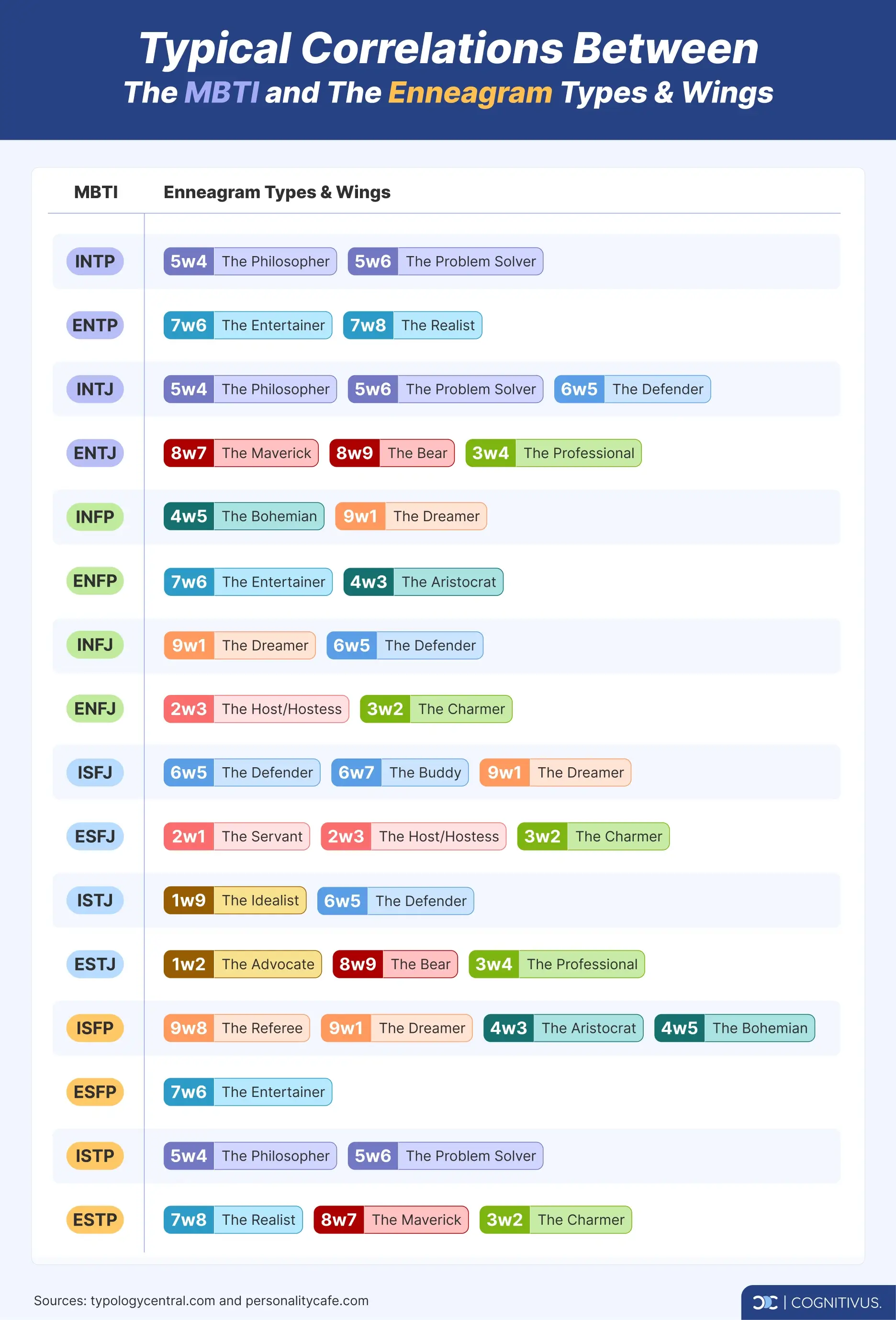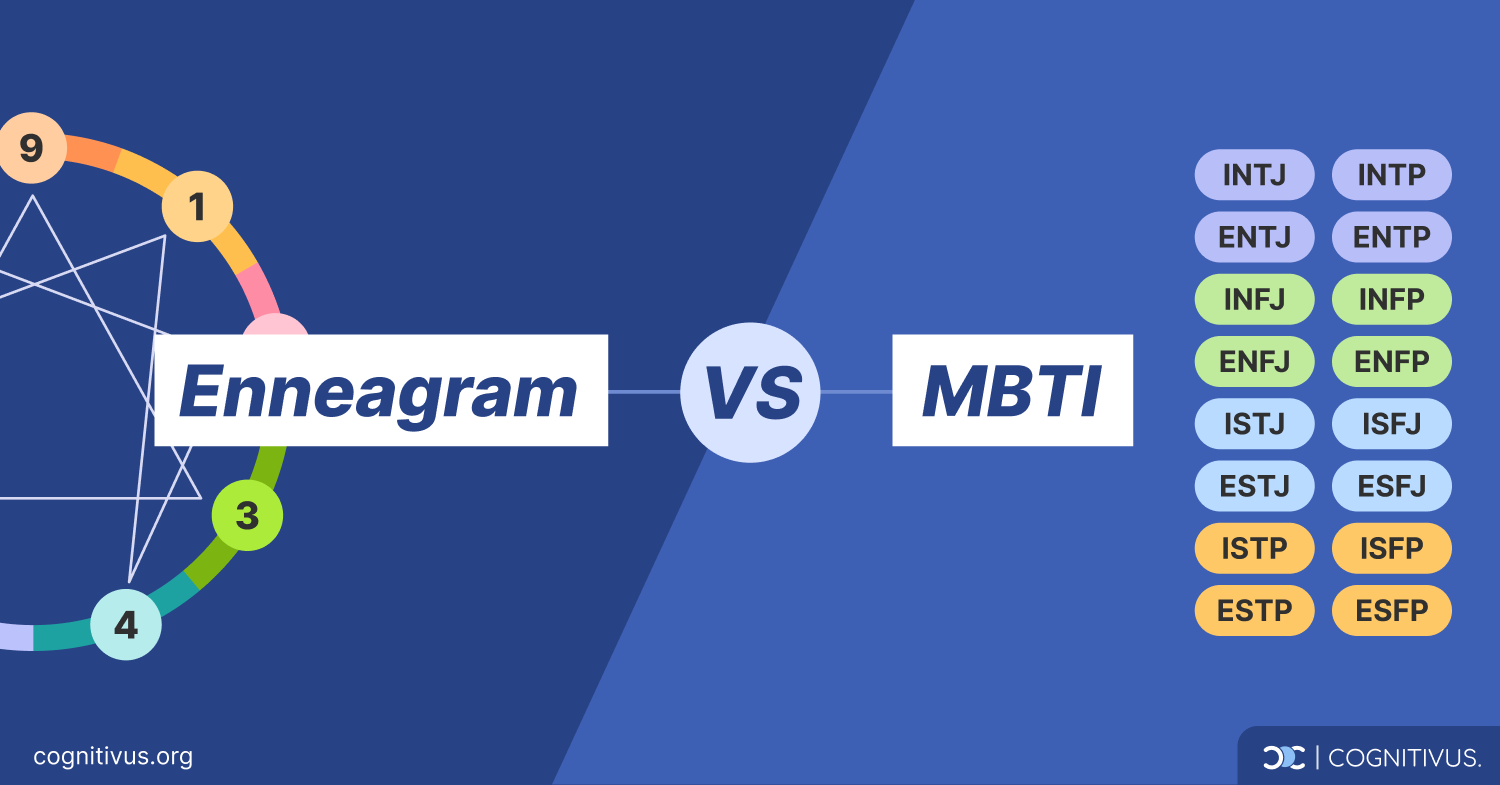Knowing yourself is the beginning of all wisdom
~ Aristotle.
This timeless truth from the famous Greek philosopher may explain why personality assessments have become so popular these days.
Among the many options available, the Myers-Briggs Type Indicator (MBTI) and the Enneagram stand out as two of the most popular.
In this article, we'll break down the key differences between the two to help you decide which one is the best fit for you. We’ll also reveal the MBTI equivalents of each Enneagram type and Enneagram wings.
Let's get started!
1. Definitions
What is the Enneagram?
The Enneagram is an ancient system that describes nine main personality types, each with its own unique view of the world and core motivation. Whether you see yourself as an achiever, a helper, or someone who challenges the norm, the Enneagram can help you understand your true self. It can highlight all your strengths and areas to grow, to encourage your own personal development. As well as this, it can also shed light on why you react the way you do to certain situations, showing that everyone's core fears and desires are equally important and valid.

What is the MBTI?
Based on the theory of psychological type by Carl Jung, the Myers-Briggs Type Indicator (MBTI) sorts personalities into 16 different types. It focuses on how you gather information and make decisions. For example, do you rely on facts or follow your gut? Do you prefer planning or keeping options open? The MBTI helps you understand these preferences, often clarifying how you interact with the world. It does so by using four different dimensions: Extraversion (E) vs. Introversion (I), Sensing (S) vs. Intuition (N), Thinking (T) vs. Feeling (F), and Judging (J) vs. Perceiving (P). Each of these dimensions represents a spectrum, and individuals fall somewhere along each spectrum, resulting in one of sixteen possible personality types.
What’s the point of personality systems?
Both the Enneagram and MBTI are tools for self-discovery; they help you comprehend who you are now and who you can become. Knowing and understanding these aspects of yourself is crucial for both psychological and spiritual growth, and encourages you to look beyond simple labels. This can allow you to embark on a transformative journey.
These frameworks reveal why you react differently from others and why some tasks drain you while others energise you. Whether you're an introvert craving a bit of quiet and time to recharge or an extrovert who thrives on social energy, personality systems validate your experiences, making you feel understood and seen!
2. Key Differences Between The Enneagram and The MBTI
Think about understanding a person in two ways: one looks at their actions, while the other delves into their motivations. One focuses on what they do, while the other thinks about why they do it. This is the main difference between the MBTI and Enneagram. Each test shines a light on different aspects of our behaviour and inner world.

On one hand, The MBTI identifies how you prefer to handle life's moments, asking if you rely on concrete data or intuition, and if your decisions lean more on logic or feelings. It categorises these preferences into 16 personality types.
On the other hand, the Enneagram explores the core motivations behind your actions, like the need for security, love, or independence. It’s all about understanding why you do what you do, rather than how you behave outwardly at a surface level. The Enneagram leans more towards the nurture side of personality development, suggesting that our types are shaped by responses to early childhood experiences.
MBTI tackles the "how" of your interactions with the world, while the Enneagram digs into the "why" of your perspectives. Both tools expand your self-understanding, but they just approach it from different angles. The MBTI tends to be more analytical, breaking down personality into distinct parts, while the Enneagram offers a holistic view with its focus on your core fears and desires.
3. Which Is More Accurate?
Accuracy matters when it comes to personality tests. You want results that resonate with you. So, how do the Enneagram and MBTI compare?
Research shows MBTI's broad use and scientific support. It's a trusted tool for understanding social behaviour and teamwork.
The Enneagram focuses on what motivates you. While it might not have as much scientific backing as the MBTI, it opens up important conversations about your core values, especially in personal growth and talent management.
So, which is more accurate? MBTI may have more scientific rigour, but the Enneagram test offers valuable insights into your inner world. Each test highlights different parts of your personality, making them both useful. Neither system is "better" than the other; they serve different purposes and can be used together for a more complete understanding of yourself.
4. Is the MBTI More Useful Than the Enneagram?
Let's talk about how these tests can help you in daily life. Both the Enneagram and MBTI offer tools for better communication and personal growth.
The MBTI can aid in your understanding of how you process information and make decisions, which can help improve your personal and professional relationships. This insight can explain why a colleague prefers data over intuition or why a friend values feelings over logic. It is the simplicity of the MBTI that makes it a quick and easy way to get to know people!
The Enneagram, instead, goes deeper into your motivations. It can be powerful for personal growth, helping you to recognise and challenge your fears and desires. This system offers a more nuanced and flexible understanding of personality.
So, which test is more useful really just depends on what you're looking for. The MBTI is great if you just want a quick, straightforward and easy way to understand how you and others process information and make decisions. But, The Enneagram may be better if you are seeking deeper insights into your motivations and want a more comprehensive tool for personal growth.
Both tests are practical tools that provide reason and clarity to personality differences. Whether they’re for team-building or self-reflection, their benefits include enhanced empathy, better self-awareness, and increased mutual understanding.
5. How to Choose Between Enneagram and MBTI
Find the right fit
Choosing a personality test is personal, much like finding the perfect pair of shoes. It boils down to what you want to discover. Here are some questions to guide you:
- Do you want to understand what drives your actions?
If so, the Enneagram might be for you. It uncovers core motivations and emotional currents. - Are you more interested in how you interact with the world?
If yes, the MBTI might be more exciting, since it maps out your preferences and tendencies. - Do you seek deep insights into your motivations and desires?
The Enneagram offers a deep dive into your inner self. - Are you curious about how you process information and make decisions?
The MBTI helps you understand your mental processes and decision-making styles. - Do you want a quick and straightforward tool to get to know people better?
The MBTI offers simplicity and ease of use, making it great for team-building and communication. - Are you looking for a more nuanced and flexible understanding of personality?
The Enneagram shows how traits from different personality types can influence each other, giving you a comprehensive view of your personality.
Combine both for a full picture
So, why choose just one when you can use both to get a complete view? Saleh Vallander, an expert in both systems, believes they complement each other, each highlighting different parts of our nature.
The Enneagram connects with our emotional core, while the MBTI aligns with our thinking processes. Therefore, together, they offer a rich portrait of our personalities, balancing instincts with logical thoughts. This dual approach helps those who don't fit stereotypes, offering a well-rounded perspective.
Facing a challenge at work? Well, the MBTI can show you how to use your strengths, while the Enneagram can reveal the fears holding you back. Together, they create a complete self-portrait, blending emotions with thought patterns for a thorough journey of self-discovery!
6. Correlations Between the MBTI and the Enneagram Types
To compare the Enneagram and MBTI, several surveys and studies have been done using data from test results. They aimed to see if there are correlations between these systems and how often each type appears within the other.
For instance, according to this table, it was found that the ESFP type correlates well with the Enneagram type 7 (The Enthusiast), and more specifically with the Enneagram type 7 wing 6 (7w6, also known as The Entertainer). Both types are energetic, love new experiences, and thrive in social settings, enjoying fun and excitement.
Similarly, the ENFJ type is associated with wing 2 of Enneagram 3 (3w2, The Charmer), reflecting a natural charisma and focus on personal success, while still maintaining a strong desire to help others.
Likewise, the ESFJ type is linked with wing 1 of Enneagram Type 2 (2w1, The Servant), which combines the nurturing qualities of Enneagram Type 2 with the sense of responsibility and perfectionism found in Enneagram Type 1. This blend results in a personality that is both deeply empathetic and driven by a strong moral compass, striving to help others in practical, organised, and ethical ways while thriving in supportive social environments.

These patterns reveal how the two systems intersect and offer a deeper understanding of personality dynamics.
Understanding your inner self is a vital part of growth and personality tests offer a unique insight into this. By combining insights from both tests, you can gain a more holistic and rich picture of your personality, helping you to navigate life with greater awareness and empathy.



